At last we near the end of the autumn term and head towards Christmas. I hope that Santa has been browsing the shelves, perhaps inspired by some of the suggestions from this blog, and will be filling stockings with some tasty morsels of literature.
Last time, Harry wrote about Welsh writer Sarah Waters. Following on from that, you may be surprised and intrigued to discover that Alfred Hitchcock, legendary film-maker, was inspired by another Welsh woman writer, Ethel Lina White. While Hitchcock is well known, from films like The Birds, Psycho, Strangers on a Train and North by Northwest, I should imagine that you haven’t heard of Ethel White. Yet she was once heralded as a crime writer on a par with the greats of her field. It is another case of a writer, especially women writers, falling into relative obscurity, and seems deeply unfair for someone who gave Hitchcock material for his start. You can, though, still read White’s fiction, as some of her books are still in print. Read more about the story here.
Linked to this is the story of Shakespeare’s female editors. Most of the editors of Shakespeare’s works that we know are male, but many women have been deeply involved in Shakespeare scholarship and this article focuses on them.
 While writing about Shakespeare, I must mention a defining moment of my own experience of his work, which was seeing a production of King Lear in Stratford, with the great Michael Gambon as Lear, and Antony Sher as the Fool, complete with red nose. Directed by Adrian Noble, it was a spellbinding, gut-wrenching production. It so defined the play for me that for years I couldn’t watch another Lear and when I did, it was a horrific disappointment (sorry, Anthony Hopkins). Antony Sher died at the beginning of this month after a long cancer illness, and we have lost one of the greatest actors. He went on to play Lear himself in 2018, a production which I sadly did not see, but I was lucky enough to see him play Tamburlaine and Richard III. In many ways, his wild performance as Richard, flinging himself about the stage on a pair of crutches, black cloak flapping, defined him as an actor and solidified his reputation. Sher’s book about the preparations and performance of the production, The Year of the King, complemented by his own sketches, is one of the best Shakespeare and theatre books you will read, giving fascinating insight into the process of a production, the commitment of actors and the challenges of Shakespeare. It was so good, I didn’t want it to stop. I also saw Sher as the lead in Peter Flannery’s Singer, a furious play about the exploitation of the housing rental market in 1960s London. Many of you will have seen Sher’s comic turn as the apothecary in Shakespeare in Love. Read this tribute to the great man.
While writing about Shakespeare, I must mention a defining moment of my own experience of his work, which was seeing a production of King Lear in Stratford, with the great Michael Gambon as Lear, and Antony Sher as the Fool, complete with red nose. Directed by Adrian Noble, it was a spellbinding, gut-wrenching production. It so defined the play for me that for years I couldn’t watch another Lear and when I did, it was a horrific disappointment (sorry, Anthony Hopkins). Antony Sher died at the beginning of this month after a long cancer illness, and we have lost one of the greatest actors. He went on to play Lear himself in 2018, a production which I sadly did not see, but I was lucky enough to see him play Tamburlaine and Richard III. In many ways, his wild performance as Richard, flinging himself about the stage on a pair of crutches, black cloak flapping, defined him as an actor and solidified his reputation. Sher’s book about the preparations and performance of the production, The Year of the King, complemented by his own sketches, is one of the best Shakespeare and theatre books you will read, giving fascinating insight into the process of a production, the commitment of actors and the challenges of Shakespeare. It was so good, I didn’t want it to stop. I also saw Sher as the lead in Peter Flannery’s Singer, a furious play about the exploitation of the housing rental market in 1960s London. Many of you will have seen Sher’s comic turn as the apothecary in Shakespeare in Love. Read this tribute to the great man.
In a completely different vein, I included a TED talk by Oscar Schwartz in September last year about computers writing poetry. Now an AI robot, called Ai-Da, is reciting poems based on Dante’s Divine Comedy – not just reciting, but giving performances. Poet Carol Rumens admits there are some problems with elements of the verse, but also says ‘there’s hope for the robot-poet.’ Read about the project here.
Finally, Merry Christmas from the Poetry Archive. Here is their Christmas bulletin.